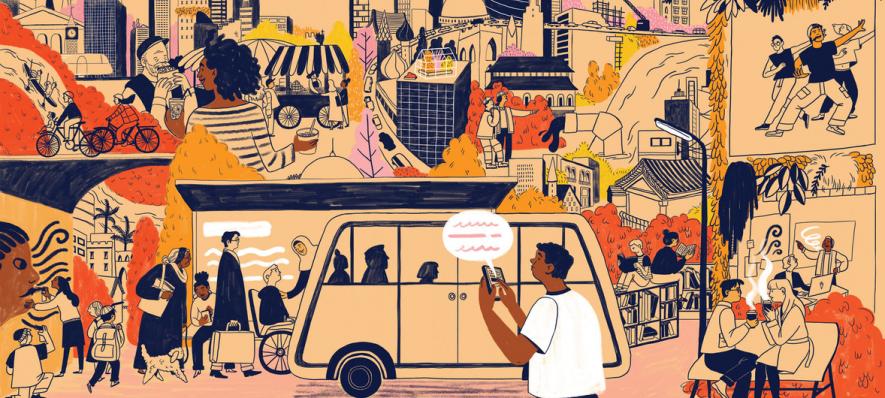World Cities Day: Can Technology Serve the Purpose?

Image Courtesy: UN News
October 31 is United Nation’s World Cities Day and the theme for this year is “Changing the World: Innovations and Better Life for the Future Generations”. Antonio Guterres, UN Secretary General has said, “Let us commit to embracing innovation to ensure a better life for future generations and chart a path towards sustainable, inclusive urban development that benefits all.” Over half of the world’s population now resides in cities and with rapid urbanisation, the number of people will almost double by 2050. While cities provide ample opportunities for better living, there are immense challenges that the cities face globally. The slogan of ‘better living with sustainable development linked with technological innovation’ may prove extremely hollow and delirious in case the phenomenal wealth that gets generated in the cities is not distributed equitably.
John Closs, the former executive director of Habitat III had expressed similar views about sustainable development in cities. He had categorically remarked in the Habitat conference in Quito that in case the socio-economic system is inherently unsustainable, we cannot imagine sustainable cities. And, to get to that we need to go the basics of development. He was equally critical of the way in which cities were being developed in the last few decades. The whole notion of laissez faire i.e., the free market economy to decide the course of development in cities, should be given up, John vehemently stated. The cities cannot be run as entrepreneurs where these are considered as business units, and through competitive bidding, they compete against each other. This methodology of city development has not succeeded and we need to go back to the basics of planning.
The vision for World Cities Day 2019 seems to be following the same old dictum of privatising the cities by allowing big technology giants to operate and manage the affairs, and, then believe that these technological solutions will make the cities a better place to live, and make them inclusive and sustainable. There are doubts over such a belief and handing over the city resources to mega technological giants is not going to help the cites to come out of its real problems. Public Private Partnership (PPP) is considered to be the mantra of success for city development. However, the last few decades suggest that there is hardly any investment in the cities made by the private sector and that this sector has mainly been interested in smart city solutions like internet of things, etc. Using technology to advance the vision of better living is also linked to it.
Also read: Why Flooded Cities Are Becoming Common These Days
The main goals of World Cities Day 2019 are listed below:
-
Increase awareness of how digital innovations can be used for urban service delivery to enhance the quality of life and improve the urban environment.
-
Show new frontier technologies that can create more inclusive cities.
-
Present opportunities for renewable energy generation in cities.
-
Explore how frontier technologies can promote social inclusion in cities.
The market for digital innovation is a very big and large companies are eyeing cities as potential spaces for maximising their profits through their interventions. It can come in the form of smart city projects, smart control command centre, putting cities under complete surveillance through the use of smart cameras, etc. Bloomberg reported that the internet of things (IOT) represents a $19 trillion opportunity. Forbes estimated that the smart city industry is expected to become an over $1.5 trillion market by 2020. This new industry signals the privatisation and financialisation of public service provisions, and will accelerate the growth of inequality in our societies by brining increased convenience and services to the wealthy few at the cost of the public as a whole.
Privatisation of Cities in India Under Modi Government
In India, the Modi government is following the same dictum of privatisation of cities as a whole. Technological solutions are offered to create an environment that it can be a panacea for all the ills in Indian cities. The technological smart city is curtailing individual freedoms and rights, and leading us to an Orwellian future. The new smart cities’ effort has promised progress by using technology to fix some of the most mundane and difficult urban planning problems. As we know, technology is inherently neither good nor bad and can be used to advance human progress or further human exploitation and violence.
The biggest proponents of smart cities fail to explain that they are seeking to privatise our ‘city commons’ and in turn sell data that they will collect from every move to the highest bidder, in perpetuity. Cities in Asia and Global South stand to lose the most in this game.
Also read: Code on Wages Act and Scope of the City to Intervene
The Indian cities are facing another major challenge of massive unemployment which is the highest in the last 45 years. Urban employment is just about 28% for the working population according to the Centre for Monitoring Indian Economy (CMIE) data. In such a scenario, the whole notion of inclusive cities cannot brush aside this reality and must consider steps to eradicate it. Some of the civil society groups working in the urban realm and Left political parties have raised the demand of an urban employment guarantee scheme which shall not just be highly beneficial for inclusive development in the city but shall also be able to manage some of the city affairs/works which the city governments are always looking for outsourcing.
Another important challenge facing the Indian cities is a huge shortfall of urban planners. In more than 9,000 urban agglomerations in the country, the ratio of urban planners in the country is 0.23% for a population of 100,000 whereas Britain has 38 planners for the same number of people. This in itself shows the need for immediate intervention for planned development in Indian cities. A popular saying has emerged for the satellite towns in the country that, “the people inhabit the city spaces first and then the planning of the city begins.” This cannot be a sustainable model of development. Romi Khosla, one of the finest planners from independent India, has stated that there should be an ease-out period for the planners before they join the masters course. They should be given a reasonable sum to sustain and asked to work at least for two years in the Indian cities and prepare their plans.
Finally, the common issues and challenges that most of the Indian cities face are poor governance, multiple jurisdictions (despite 74th constitutional amendment), very weak revenue base and understaffed local bodies. The flagship smart cities programme (SCP) of the Government of India which should have become lighthouses for mitigating these challenges has further accentuated the problems. Instead of strengthening the democratic structure and authority of the elected bodies and empowering the people, it(smart city) has undermined them altogether. Some of the commentators have even termed the SCP as an ‘obituary of the 74th constitutional amendment’.
Also read: Another Knee Jerk Reaction In The National Urban Policy Framework
In such a background, the World Cities Day 2019, which just focuses on technologically-driven development and finding solutions in it will be a blurred vision and may not serve the purpose of inclusive and sustainable development.
The writer is former Deputy Mayor of Shimla, Himachal Pradesh. The views are personal.
Get the latest reports & analysis with people's perspective on Protests, movements & deep analytical videos, discussions of the current affairs in your Telegram app. Subscribe to NewsClick's Telegram channel & get Real-Time updates on stories, as they get published on our website.























